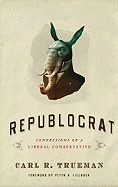
Carl Trueman is one of the keynote speakers at the upcoming Renewal Conference at Westminster Reformed Presbyterian Church in Suffolk, Virginia. The title of the conference, Voting for Jesus: Engaging Politics with the Gospel, suggests that there will be a rollicking good time. To gear up for the festivities, I decided to read Trueman's short book, Republocrat: Confessions of a Liberal Conservative (P&R 2010).
Trueman has the advantage of an outsider; he's English. While he understands the political issues facing contemporary America, he's not so deeply embedded in the process that he can't see the bigger picture. And while he frankly admits his British political proclivities, he's careful to plant all political processes outside the work of the Church.
It's that point--the American penchant to identify political positions with the Kingdom of God--that most exorcises Trueman. While he's quick to place the blame for the politicization of the Christian faith on both the Left and the Right, his comments are mostly directed at the Right's successful merger of Evangelical Christians, the Republican Party, and Fox News. This Rightward focus makes sense given Trueman's professional and ecclesial milieu. He is an ordained minister in the Orthodox Presbyterian Church and serves as Dean at Westminster Theological Seminary both of which are largely populated by well, let's face it, older, white, conservative folks. While his critiques of evangelical blindness are largely spot-on, co-authoring the book with a like-minded alien posted in a Left-leaning institution might have made the book even more appealing.
More "fair and balanced" would not, however, have improved it. Trueman's penchant for well-placed zingers make the book fun to read. Never snarky but not kind and gentle, either.
Trueman is by no means indifferent to the effects of culture. He freely acknowledges that the leading contemporary form of economic activity, capitalism, has done more to eliminate poverty than anything in history. (Click here for a perceptive piece supporting just this point.) But Trueman implores Evangelicals thereby neither to identify a particular form of capitalism with the Gospel nor to forget that capitalism does not exist without (and indeed might undermine) the virtues of civic life necessary to maintain that very system.
In true American bottom line, pragmatic fashion, I think Trueman's most significant observation is this: the meliorating effects of two-party democracy undercuts the Manichean tenor so many Americans invest in our recurring quadrennial election cycle. If each of the past [fill in the blank] elections had been as billed--the "most important ever"--why does so little seem to have changed? And why should we believe that this is the one (candidate or election)? God's kingdom will prevail regardless of the next American president.
So come on out to the Renew Conference on February 24-25. Good fun should be had by all.




No comments:
Post a Comment